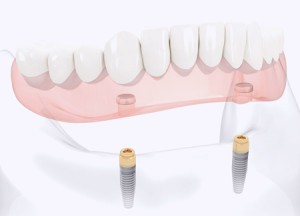 Few denture wearers have problems with upper dentures, but the opposite is true for lower dentures. As many as 9 out of every 10 people with lower dentures are highly dissatisfied with them. The most common problems are dentures that slip or move during speaking or eating, and pain on biting. Many denture wearers have suffered in silence, believing it was just part of wearing dentures.
Few denture wearers have problems with upper dentures, but the opposite is true for lower dentures. As many as 9 out of every 10 people with lower dentures are highly dissatisfied with them. The most common problems are dentures that slip or move during speaking or eating, and pain on biting. Many denture wearers have suffered in silence, believing it was just part of wearing dentures.
Until recently, the only solution to these problems was costly and invasive implant surgery. This surgery was not only out of reach for many denture wearers due to the cost, but was unsuitable for many due to a lack of sufficient bone to support the implant.
With new, smaller implants supported dentures, comfortable, confident smiles and pain-free eating is within reach for most denture wearers.
Implant supported dentures from Brighton Dental use implants that are much smaller than traditional implants. Placing these implants is much less invasive than traditional implants, requiring no stitches. They are also much easier to place and much less expensive than traditional implants. They can be placed in under an hour and the patient can walk out with their newly refitted dentures immediately. These smaller implants also require less bone, so many patients who have been turned down for implants in the past are good candidates for this new procedure.
“Compared to procedures for larger implants, the narrow body implant procedure, available from several companies, is non-invasive and more convenient because the implants can be immediately loaded,” explains Gordon J. Christensen, DDS, MSD, PhD, who co-founded and consults for the highly respected Clinical Research Associates. “They can be placed less expensively because they are simple to place, and they cost less coming from the manufacturer.” Traditional implants cost $7,000 or more, but with placing these new smaller implants and refitting existing dentures can all be done for as low as $1,500.
Nels Ewoldsen, DDS, MSD, a clinical researcher for DENTSPLY Prosthetics, says there is evidence to suggest that implants used on lower dentures to hold them in place may be able to help protect and maintain bone mass in the lower jaw. Preserving bone becomes more important as denture wearers age.
“This is a minimally invasive procedure, and the process for securing the denture to the implants is less complicated than it is for any other small diameter implants currently marketed,” Ewoldsen says. “The fact that you can fit a denture to the Brighton Denture Comfort implants more simply, with less hardware, with fewer steps—in addition to the procedure being non-invasive—is what attracts me to it.”
Read more about Dr. Vinograd & Brighton Dental at DrVinogad.com
